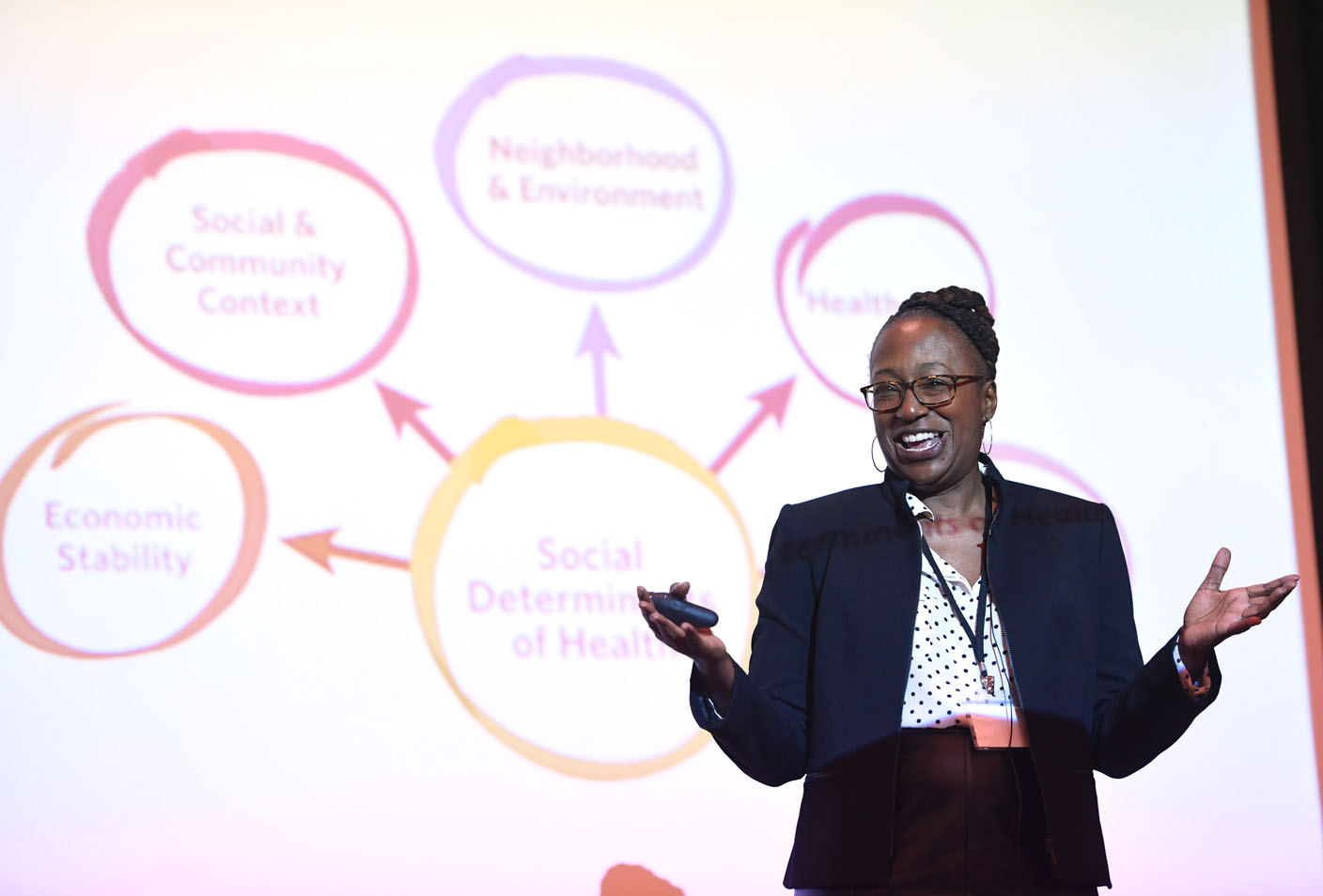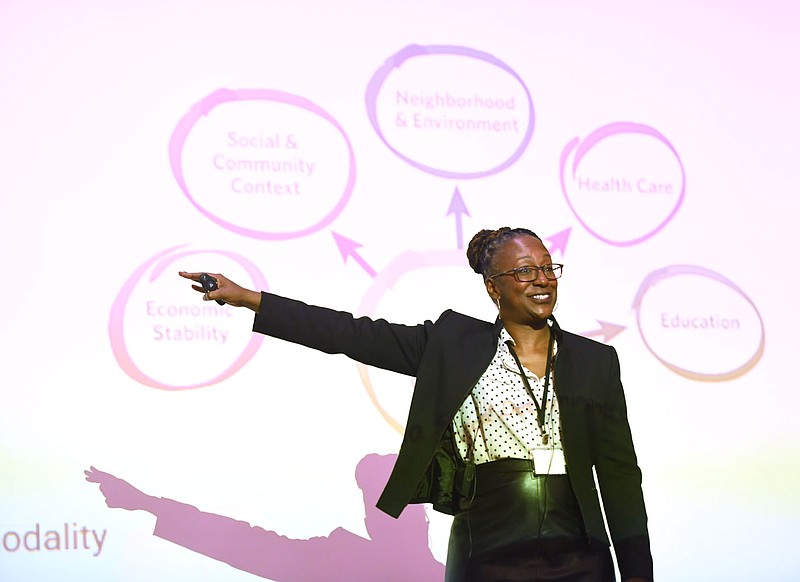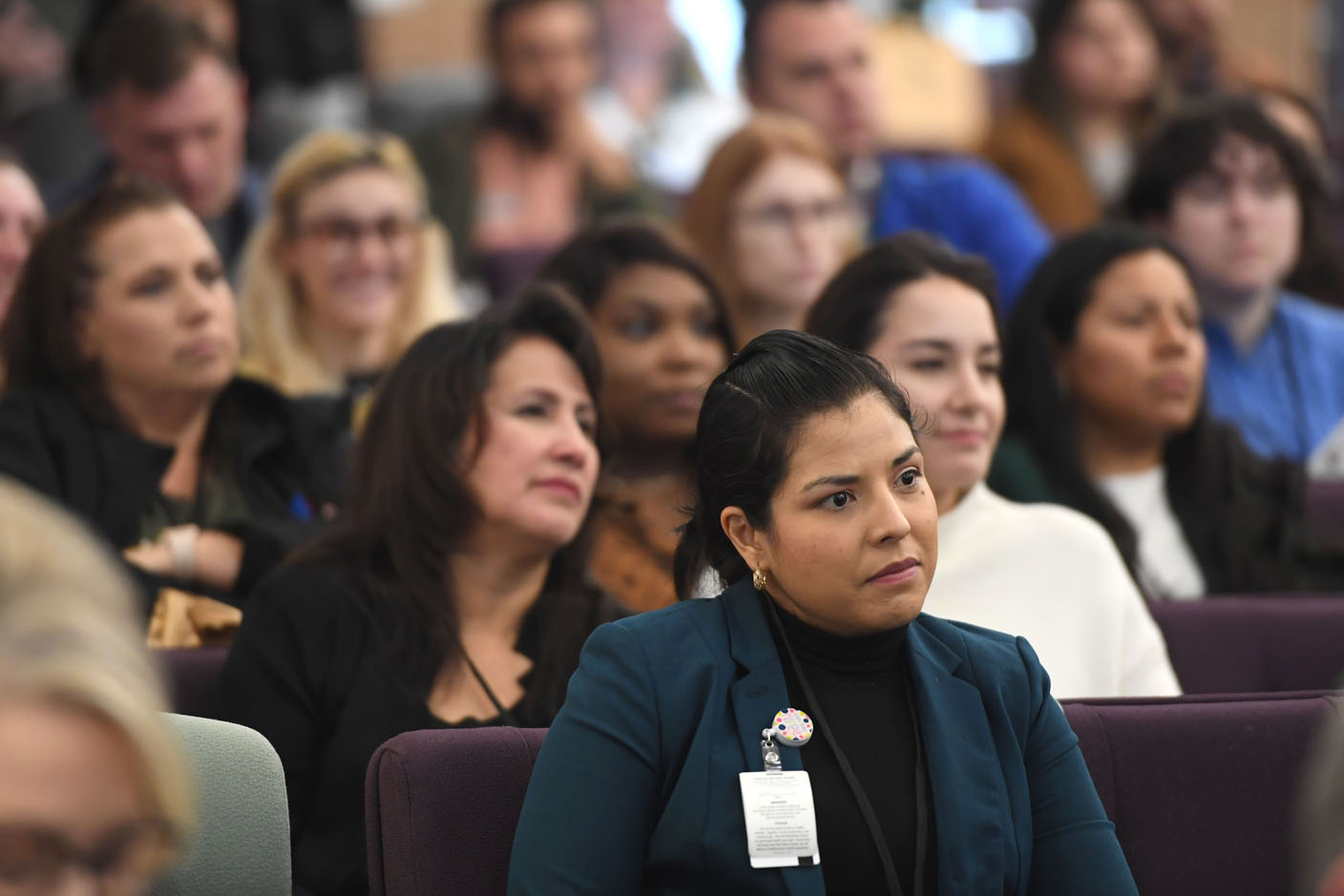SPRINGDALE -- If health is impacted in part by social circumstances, then Northwest Arkansas needs a health workforce that reflects that reality, regional health leaders said at the NWA Health Summit on Friday.
Frontline public health workers who are trusted members of local communities will play a key role in addressing social determinants of health like discrimination, housing, transportation and education as the region grows, according to Dr. Creshelle Nash, medical director for health equity and public programs at Arkansas Blue Cross Blue Shield.
The goal of health equity -- making sure every person has the opportunity to attain their full potential and no one is disadvantaged from achieving their potential because of socially determined circumstances -- should be everyone's concern, she said.
Nash and others at the conference, presented at The Jones Center in partnership with the Northwest Arkansas Council, Blue Cross Blue Shield, Whole Health Institute, University of Arkansas for Medical Sciences and Walmart, pointed to the work of community health workers during the covid-19 pandemic to show the relationship of community health workers to health equity.
Research from multiple state agencies has shown Arkansas' Hispanic and Black populations had higher covid-19 infection rates than whites.
During the peak of the covid-19 pandemic, community health workers in the state increased access to testing, care and vaccine information and helped those in quarantine or in need of food, utilities and transportation assistance, Nash said.
Amanda Echegoyen, chief operating officer of Community Clinic NWA, said community health workers found at the beginning of the pandemic that some residents could not afford to feed their families if they quarantined for two weeks.
Community Clinic hired a team of community health workers to call quarantined residents, identify where urgent help was needed, coordinate food and prescription deliveries and facilitate telehealth visits, she said.
Ryan Cork, executive director of the Northwest Arkansas Council's health care transformation division, said bilingual community health workers with the council helped offer similar services to residents who may not have known how to navigate the region's health care system. Many of the people served may not have otherwise received any care, he said.
Health literacy is also an equity issue, according to Alison Caballero, director of the UAMS Center for Health Literacy.
To strive for equitable health outcomes, health providers and organizations should make sure Arkansans, especially elderly and low-income residents and minority communities, can find, understand and use information and services to inform health-related decisions and actions.
"Covid gave us this real illustration," she said. "Racial and ethnic minorities had a different covid experience."
NEEDED GROWTH
Research has shown community health workers help reduce hospitalizations and shorten hospital stays, according to Nash.
The role is not new to Arkansas, but the number of community health workers is growing, from 124 in 2020 to 273 in 2022, she said. Of that latter number, 241 of the workers were paid and 32 were volunteers.
Community health workers need to be seen as an integral part of the region's workforce, which will have to grow significantly in the coming years to meet community health needs, Cork said.
"We'd be foolish if we thought we'll hire -- you know -- 100 more doctors and that solves the problem. It doesn't," he said. "It's a full team that we need and that team care approach."
Corina Huston, who manages a team of community health workers at Mercy Hospital in Rogers, said physicians do not have the time to connect and assist patients like community health workers.
Sustainable funding and career development are some of the looming challenges for the profession.
Many organizations depend on grants to fund community health worker positions.
Stephen Coger, director of Arkansas Immigrant Defense, said he imagines community health workers with the nonprofit law firm will continue to have to be funded by grants.
Career opportunities will have to be a priority as more community health workers enter the field and get certified, according to Anna Huff Davis, chair for the Arkansas Community Health Worker Association Board of Directors.
"I'm excited about all this momentum around community health workers, but we need to make sure that we have an end result for this movement," she said.
In some cases, the movement has extended to police departments.
The Fayetteville Police Department has hired two full-time social services advocates, similar to community health workers, in recent years to help reduce the criminalization of those struggling with mental health issues and addiction. The social services advocates are paired with officers trained in crisis intervention when responding to calls.
Lt. Tim Shepard, who has helped integrate the workers into the department's patrol response, said the program has found more than half of its calls were from people who needed housing or could not pay rent, he said.
The program has also seen the number of calls and total time spent on calls related to intoxicated persons, mental health crises, suicide threats and welfare concerns drop from 2021 to 2022, he said.
According to Shepard, the program has also had an impact on the department's culture, and other police departments have reached out to learn how to implement similar programs.
"It's really helped our whole department change and have more empathy with these issues," he said.
 Dr. Creshelle Nash, medical director for health equity and public programs for Arkansas Blue Cross Blue Shield, speaks Friday, Jan. 27, 2023, during the 2023 NWA Health Summit at the Jones Center in Springdale. The summit featured a focus on inclusivity and health equity. Visit nwaonline.com/photo for today's photo gallery. (NWA Democrat-Gazette/Andy Shupe)
Dr. Creshelle Nash, medical director for health equity and public programs for Arkansas Blue Cross Blue Shield, speaks Friday, Jan. 27, 2023, during the 2023 NWA Health Summit at the Jones Center in Springdale. The summit featured a focus on inclusivity and health equity. Visit nwaonline.com/photo for today's photo gallery. (NWA Democrat-Gazette/Andy Shupe)

